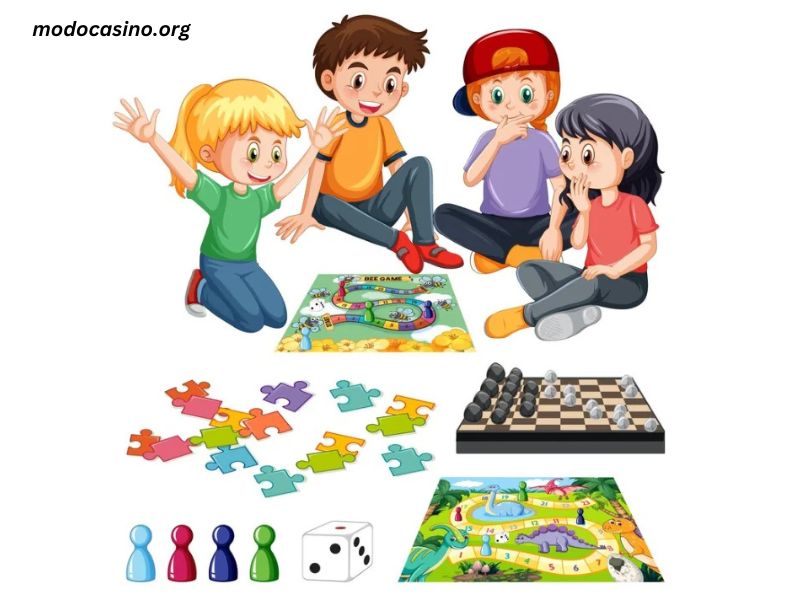Table games for kids are a great way to introduce children to a world of fun, learning, and social interaction. Whether it’s a family game night, a birthday party, or a rainy afternoon, these games offer endless opportunities for children to develop new skills while enjoying quality time with friends and family. From traditional board games to more modern, interactive options, the world of table games for kids is as diverse as it is entertaining.
Why Table Games for Kids Matter
Table games, also known as tabletop games, are activities that involve participants sitting around a table to play. These games usually come with boards, cards, pieces, or other physical components that facilitate gameplay. Unlike video games, which can sometimes isolate players in front of screens, table games for kids promote face-to-face interaction, teamwork, and critical thinking.
Here are a few reasons why table games are essential for children:
- Social Skills Development: Playing table games encourages kids to interact with others. They learn how to take turns, follow rules, and deal with winning or losing gracefully. These experiences help children develop empathy, patience, and respect for others.
- Cognitive Skills: Many table games require kids to use strategy, memory, and problem-solving abilities. Games like chess, checkers, and Monopoly involve deep thinking, planning ahead, and decision-making, which all contribute to cognitive development.
- Emotional Growth: Table games also help children navigate emotions like frustration, excitement, and joy. Learning how to manage emotions in competitive or high-stakes situations can be incredibly valuable for their emotional intelligence.
- Physical Dexterity: While table games are not typically as physically demanding as outdoor sports, they often require fine motor skills for manipulating cards, pieces, dice, and boards. This contributes to hand-eye coordination and other physical aspects of development.
- Family Bonding: Table games can bring families closer together. By spending quality time together in a shared activity, families can build stronger relationships and create lasting memories.
Types of Table Games for Kids
When it comes to selecting table games for kids, there are many options to choose from. Whether you’re looking for games for younger children or older kids, there’s a table game suited for every age group and interest. Below are a few popular categories of table games:
1. Classic Board Games
Classic board games have stood the test of time and are a staple in many households. These games are simple to learn and typically involve rolling dice, moving pieces, and following instructions on a board.
- Monopoly: One of the most iconic board games of all time, Monopoly teaches kids about money management and strategy. Players buy, sell, and trade properties in an attempt to bankrupt their opponents, all while learning about finances.
- Scrabble: Scrabble is a word game that helps kids develop their vocabulary and spelling skills. It encourages creativity and critical thinking as players form words on a grid to score points.
- Clue: In Clue, players solve a mystery by deducing who committed the crime, where it took place, and what weapon was used. This game is excellent for improving deductive reasoning and logical thinking.
- Candy Land: A perfect choice for younger children, Candy Land involves simple rules and colorful boards that teach kids about taking turns, following directions, and patience.
2. Card Games
Card games are another popular form of table games for kids. From traditional decks to specialized game cards, these games are often quick to learn and can be played with just a few players or in larger groups.
- Uno: Uno is a fast-paced, colorful card game that kids of all ages love. The goal is to get rid of all your cards by matching them to the top card in the discard pile. Special action cards add an extra level of excitement.
- Go Fish: Go Fish is a classic card game that teaches children how to match pairs and ask questions. It’s easy to learn and can accommodate several players.
- War: War is a simple card game that involves comparing cards from each player’s deck. The player with the higher card wins the round, and the goal is to collect all the cards.
- Old Maid: Old Maid is another great card game for kids, where players take turns drawing cards and trying to form pairs. The player left with the unmatchable “Old Maid” card loses.
3. Strategy Games
For older children, strategy games are a fantastic way to promote critical thinking and problem-solving skills. These games often require players to think ahead and plan their moves carefully.
- Chess: Chess is one of the oldest and most well-known strategy games in the world. It requires deep concentration and strategic thinking. Kids who play chess regularly can improve their cognitive abilities, such as problem-solving and spatial reasoning.
- Checkers: Checkers is another classic game that encourages strategic thinking. The objective is to jump over your opponent’s pieces and capture them while advancing your own pieces to the other side of the board.
- Settlers of Catan: Settlers of Catan is a popular strategy board game where players collect and trade resources to build settlements and roads. This game involves negotiation, planning, and managing resources, making it perfect for older children.
- Risk: Risk is a world domination game that involves strategy, luck, and negotiation. Players control armies and conquer territories, all while attempting to outsmart their opponents.
4. Party Games
Party games are designed for larger groups and are perfect for gatherings and family celebrations. These games are fun, fast-paced, and often hilarious.
- Pictionary: In Pictionary, players take turns drawing pictures to represent words or phrases while their teammates try to guess what they are drawing. It encourages creativity and teamwork.
- Charades: Charades is a game where players act out words or phrases without speaking, and others have to guess what they are. It’s a great game for encouraging communication and non-verbal expression.
- Twister: Twister is a physical game that requires players to place their hands and feet on colored circles on the mat. It’s a fun way to challenge kids’ flexibility and balance while laughing together.
5. Educational Games
Table games can also be educational, helping children learn new concepts in a fun and interactive way. These games are designed to teach skills like math, geography, language, and more.
- Math Bingo: A fun twist on the classic bingo game, Math Bingo incorporates addition, subtraction, multiplication, or division into the game. Kids must solve problems to match numbers on their bingo cards.
- Zingo: Zingo is a matching game that helps young children build their vocabulary and image recognition skills. It’s great for preschoolers learning to match words with pictures.
- Scrambled States of America: This game teaches kids about U.S. geography. Players match states with their correct locations on the map and try to collect the most cards to win.
- Brainiac: Brainiac is a trivia game that challenges kids on various topics like science, history, and literature. It’s an excellent way to help kids retain new information while having fun.
Benefits of Table Games for Kids
Table games are not only enjoyable, but they offer a range of benefits that extend beyond the game itself. Here are some of the positive impacts table games can have on children:
- Improved Social Skills: Kids learn how to cooperate, communicate, and resolve conflicts while playing table games. They practice teamwork, negotiation, and empathy.
- Increased Focus and Concentration: Many table games require children to focus and think for extended periods, which can improve their attention span and ability to concentrate.
- Enhanced Memory and Cognitive Skills: Games like memory match, chess, and trivia strengthen children’s cognitive abilities, such as recall, problem-solving, and strategy.
- Physical Activity: Some table games, such as Twister, require physical movement, which is beneficial for motor skills and overall fitness.
- Creativity and Imagination: Games that involve drawing, acting, or storytelling can spark creativity and encourage imaginative thinking.
Conclusion
Table games for kids offer much more than just entertainment. They are tools for learning, socializing, and developing important life skills. Whether you choose a classic game like Monopoly or a modern strategy game like Settlers of Catan, these games bring children together, promote positive interactions, and provide endless hours of fun. By introducing your child to table games early, you can help them develop essential skills while enjoying time with loved ones. So, gather your family, set up a game board, and let the fun begin!




